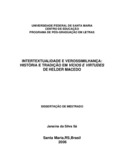| dc.creator | Sá, Janaína da Silva | |
| dc.date.accessioned | 2008-12-02 | |
| dc.date.available | 2008-12-02 | |
| dc.date.issued | 2006-09-04 | |
| dc.identifier.citation | SÁ, Janaína da Silva. INTERTEXTUALITY AND TRUSTWORTHINESS: HISTORY AND TRADITION IN VÍCIOS E VIRTUDES BY HELDER MACEDO. 2006. 111 f. Dissertação (Mestrado em Letras) - Universidade Federal de Santa Maria, Santa Maria, 2006. | por |
| dc.identifier.uri | http://repositorio.ufsm.br/handle/1/9827 | |
| dc.description.abstract | The present paper has the intention of making an appreciation of the Portuguese romance Vicios e Virtudes by Helder Macedo, from a process reading of intertextuality and trustworthiness. As theoretical material the conceptions by Julia Kristeva about the bakhitinian dialogism model were used. The analysis is done taking into account the relations established by the romance with elements from the History of Portugal and with the Lusitanian literary and cultural tradition itself. Due to these relations, notes of the effects of the trustworthiness that are found in the narrative technique levels, the actions and the characters are proposed. Besides that, it is aimed at elaborating the themes and reference functions, here classified as motives, in the articulation of the different levels in which the narrated stories work. | eng |
| dc.format | application/pdf | por |
| dc.language | por | por |
| dc.publisher | Universidade Federal de Santa Maria | por |
| dc.rights | Acesso Aberto | por |
| dc.subject | Intertextualidade | por |
| dc.subject | Motivo | por |
| dc.subject | História | por |
| dc.subject | Ficção | por |
| dc.subject | Intertextuality | eng |
| dc.subject | Motive | eng |
| dc.subject | History | eng |
| dc.subject | Fiction | eng |
| dc.title | Intertextualidade e verossimilhança: história e tradição em Vícios e virtudes de Helder Macedo | por |
| dc.title.alternative | Intertextuality and trustworthiness: history and tradition in Vícios e virtudes by Helder Macedo | eng |
| dc.type | Dissertação | por |
| dc.description.resumo | O presente trabalho tem o intuito de fazer uma apreciação do romance português Vícios e virtudes, de Helder Macedo, a partir de uma leitura dos processos de intertextualidade e verossimilhança. Como material teórico são utilizadas as concepções de Julia Kristeva acerca do modelo bakhithiniano de dialogismo. A análise se efetua levando em conta as relações que o romance estabelece com elementos da História de Portugal e com a própria tradição literária e cultural lusitana. Em função dessas relações, propõe-se o apontamento dos efeitos de verossimilhança que se acham nos níveis da técnica narrativa, das ações e das personagens. Afora isso, procura-se elaborar a função de temas e referências, classificados aqui como motivos, na articulação dos diferentes níveis em que opera a história narrada. | por |
| dc.contributor.advisor1 | Santos, Pedro Brum | |
| dc.contributor.advisor1Lattes | http://lattes.cnpq.br/8231452052035761 | por |
| dc.contributor.referee1 | Silva, Luiz Antonio de Assis Brasil e | |
| dc.contributor.referee1Lattes | http://lattes.cnpq.br/0812059400565883 | por |
| dc.contributor.referee2 | Pereira, Lawrence Flores | |
| dc.contributor.referee2Lattes | http://lattes.cnpq.br/2329033954605102 | por |
| dc.creator.Lattes | http://lattes.cnpq.br/9458347377432710 | por |
| dc.publisher.country | BR | por |
| dc.publisher.department | Letras | por |
| dc.publisher.initials | UFSM | por |
| dc.publisher.program | Programa de Pós-Graduação em Letras | por |
| dc.subject.cnpq | CNPQ::LINGUISTICA, LETRAS E ARTES::LETRAS | por |


